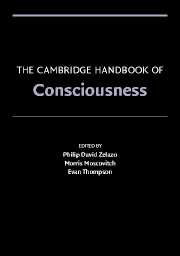Book contents
- The Cambridge Handbook of Consciousness
- The Cambridge Handbook of Consciousness
- Copyright page
- Dedication
- Contents
- List of Contributors
- The Cambridge Handbook of Consciousness
- Chapter 1 Consciousness: an introduction
- Part I The cognitive science of consciousness
- Chapter 2 A brief history of the philosophical problem of consciousness
- Chapter 3 Philosophical theories of consciousness: contemporary Western perspectives
- Chapter 4 Philosophical issues: phenomenology
- Chapter 5 Asian perspectives: Indian theories of mind
- Chapter 6 Artificial intelligence and consciousness
- Chapter 7 Computational models of consciousness: a taxonomy and some examples
- Chapter 8 Cognitive theories of consciousness
- Chapter 9 Behavioral, neuroimaging, and neuropsychological approaches to implicit perception
- Chapter 10 Three forms of consciousness in retrieving memories
- Chapter 11 Metacognition and consciousness
- Chapter 12 Consciousness and control of action
- Chapter 13 Language and consciousness
- Chapter 14 Narrative modes of consciousness and selfhood
- Chapter 15 The development of consciousness
- Chapter 16 States of consciousness: normal and abnormal variation
- Chapter 17 Consciousness in hypnosis
- Chapter 18 Can we study subjective experiences objectively? First-person perspective approaches and impaired subjective states of awareness in schizophrenia
- Chapter 19 Meditation and the neuroscience of consciousness: an introduction
- Chapter 20 Social psychological approaches to consciousness
- Chapter 21 The evolution of consciousness
- Chapter 22 The serpent’s gift: evolutionary psychology and consciousness
- Chapter 23 Anthropology of consciousness
- Chapter 24 Motivation, decision making, and consciousness: from psychodynamics to subliminal priming and emotional constraint satisfaction
- Part II The neuroscience of consciousness
- Part III Quantum approaches to consciousness
- Author Index
- Subject Index
Chapter 6 - Artificial intelligence and consciousness
from Part I - The cognitive science of consciousness
Published online by Cambridge University Press: 05 June 2012
- The Cambridge Handbook of Consciousness
- The Cambridge Handbook of Consciousness
- Copyright page
- Dedication
- Contents
- List of Contributors
- The Cambridge Handbook of Consciousness
- Chapter 1 Consciousness: an introduction
- Part I The cognitive science of consciousness
- Chapter 2 A brief history of the philosophical problem of consciousness
- Chapter 3 Philosophical theories of consciousness: contemporary Western perspectives
- Chapter 4 Philosophical issues: phenomenology
- Chapter 5 Asian perspectives: Indian theories of mind
- Chapter 6 Artificial intelligence and consciousness
- Chapter 7 Computational models of consciousness: a taxonomy and some examples
- Chapter 8 Cognitive theories of consciousness
- Chapter 9 Behavioral, neuroimaging, and neuropsychological approaches to implicit perception
- Chapter 10 Three forms of consciousness in retrieving memories
- Chapter 11 Metacognition and consciousness
- Chapter 12 Consciousness and control of action
- Chapter 13 Language and consciousness
- Chapter 14 Narrative modes of consciousness and selfhood
- Chapter 15 The development of consciousness
- Chapter 16 States of consciousness: normal and abnormal variation
- Chapter 17 Consciousness in hypnosis
- Chapter 18 Can we study subjective experiences objectively? First-person perspective approaches and impaired subjective states of awareness in schizophrenia
- Chapter 19 Meditation and the neuroscience of consciousness: an introduction
- Chapter 20 Social psychological approaches to consciousness
- Chapter 21 The evolution of consciousness
- Chapter 22 The serpent’s gift: evolutionary psychology and consciousness
- Chapter 23 Anthropology of consciousness
- Chapter 24 Motivation, decision making, and consciousness: from psychodynamics to subliminal priming and emotional constraint satisfaction
- Part II The neuroscience of consciousness
- Part III Quantum approaches to consciousness
- Author Index
- Subject Index
Summary
- Type
- Chapter
- Information
- Publisher: Cambridge University PressPrint publication year: 2007
- 28
- Cited by

